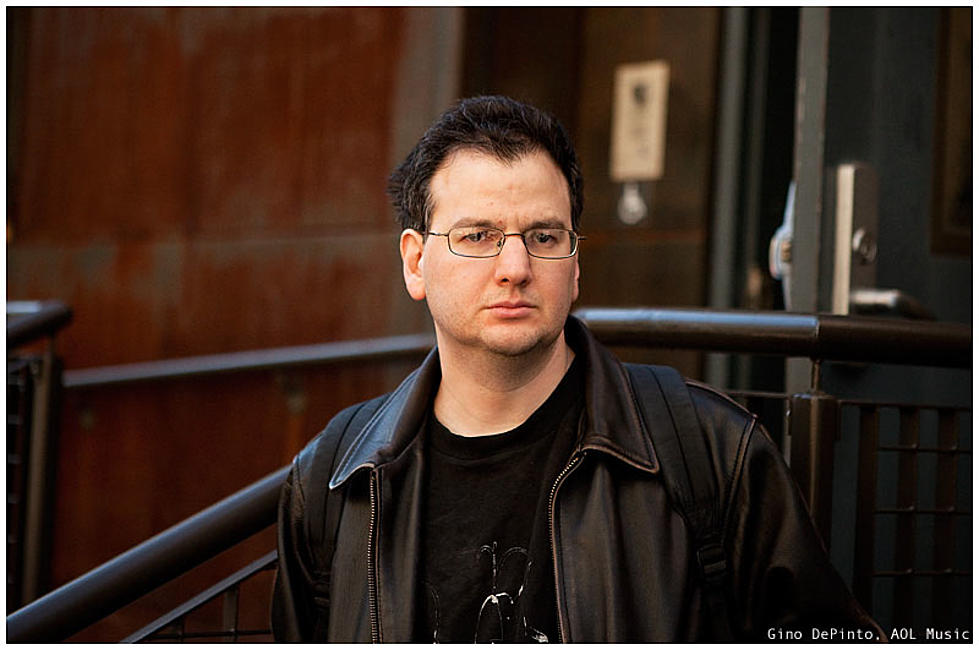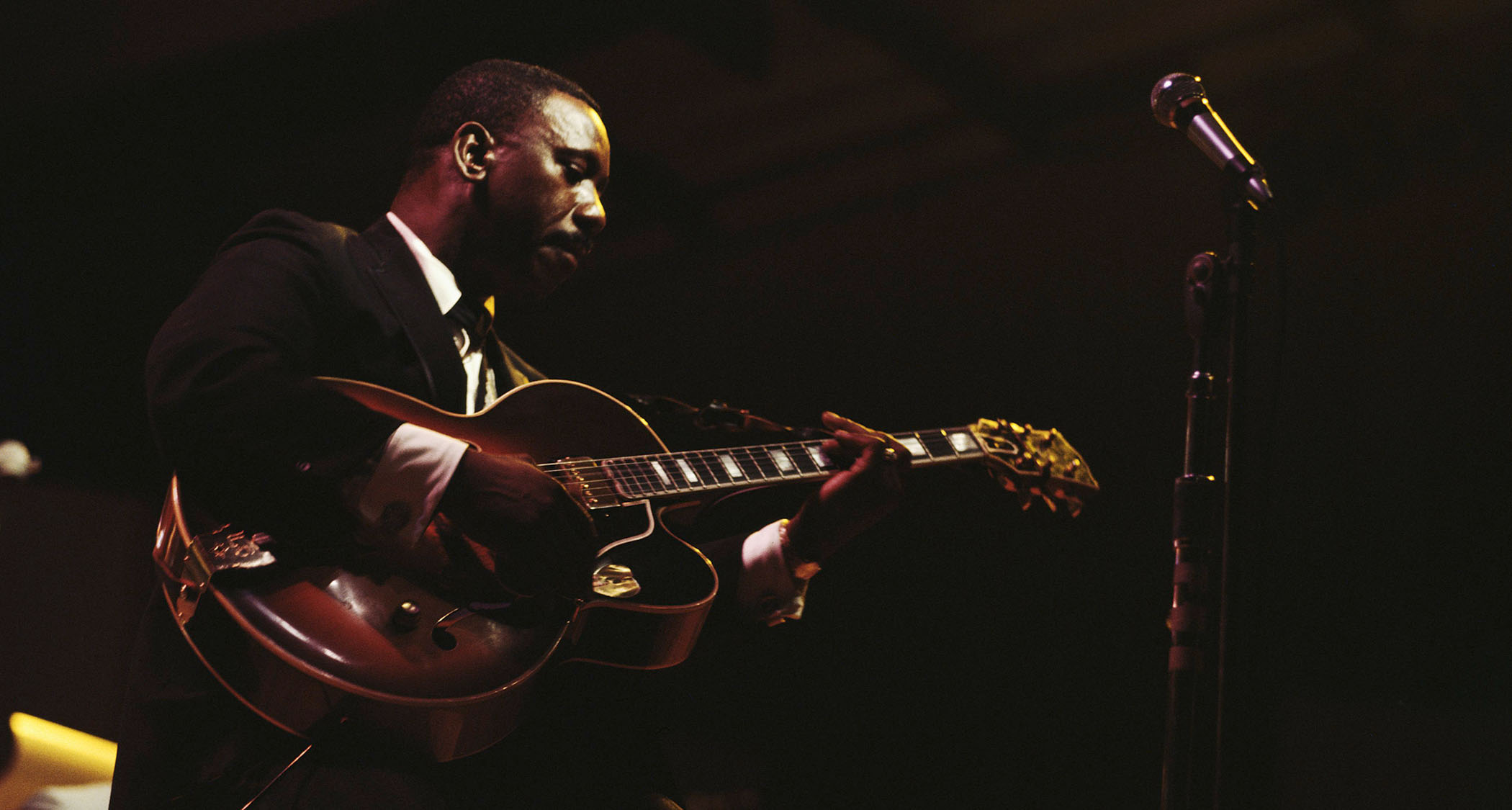August Burns Red's JB Brubaker and Brent Rambler Talk New Album, 'Phantom Anthem'

It was a humid summer night in Paris and August Burns Red were playing the last show of their European tour to celebrate the 10th anniversary of their second album, Messengers. The band was inside the belly of a boat of a club/restaurant affixed to a pier, and there were enough people in the crowd to, well, sink a ship.
For the first two songs, the crowd headbanged to the frantic riffs and moshed during the breakdowns. Then, as August Burns Red entered the final passage of “Back Burner,” the power in the venue went out, killing the amps, mics and primary stage lights.
If this had happened in 2007, back when Messengers first came out and August Burns Red were still building a following, the audience might have heckled the band or shouted, “Slayer, Slayer, Slayer!” But August Burns Red have become substantially more popular since then. The band’s video for “Invisible Enemy,” which was posted on July 27, has garnered more than 1.5 million views.
“It was quiet for few seconds, then almost everyone started chanting, ‘ABR! ABR! ABR!’ ” recalls lead guitarist and main songwriter JB Brubaker from the basement studio at his house in Manheim, Pennsylvania, about 11 miles from where August Burns Red formed. “The power was out for a good three or four minutes and the crowd was patient the whole time.”
“Some of the people shouted for us to play a drum solo, of course, because you can hear the drums inside most venues just fine without electricity,” adds rhythm guitarist Brent Rambler, who, in addition to playing tight, crunching riffs, is the more theatrical of the two guitarists.
“They were shouting pretty loud, but we were like, ‘Well, you guys are gonna hear a drum solo at the end of the set anyway, so we’re not gonna play one now.’ Then the power went back on, everyone cheered and we went right into the next song. It was pretty cool and the rest of the show was hot, sweaty and a lot of fun.”
Energetic, entertaining and fun are words frequently used to describe August Burns Red’s progressive, mosh-friendly metalcore from the time their debut album Thrill Seeker came out 12 years ago.
Get The Pick Newsletter
All the latest guitar news, interviews, lessons, reviews, deals and more, direct to your inbox!
Back then, Brubaker and Rambler played breakdown after breakdown, and a small but loyal legion of fans frantically stomped, kicked, spun and punched the air, while curious but uninitiated audience members watched the show from further back to avoid suffering a broken nose or a split lip. As the band progressed, their music became more complicated, and many of the breakdowns were replaced by multifaceted rhythms and quirky multicultural melodies that gave their music a more lighthearted sound.
“We’ve always been kind of a goofball band,” Rambler says. “I mean, come on. We play crazy metal for a living and our singer literally screams at people every song. When you think about it like that, you can’t help but see the humor in what we do.”
Still, August Burns Red have developed a reputation for offering fans new musical twists with every record. 2015’s Found in Faraway Places was filled with off-the-wall time signatures and sweeping cello and violin interludes.
The band’s new album, Phantom Anthem, is surprising in a different way. In addition to featuring offbeat rhythms and trademark lyrics about striving for independence and struggling against authority, the album includes the band’s first blatantly political song, “Hero of the Half Truth,” which takes aim at the current administration.
“That’s the sort of a subject that we have shied away from forever,” says Brubaker. “We’ve never been the least bit political. But as we’ve gotten older it’s something we’ve become more interested in because it has a direct effect on our lives.”
Not only did August Burns Red color Phantom Anthem with “Hero of the Half Truth,” they imbued the entire record with new shades of darkness and tension, reflecting the duality and division in today’s society in songs like “Invisible Enemy” and “Lifeline,” which contain far fewer of the musical quirks and flourishes on which they’ve previously thrived. Even when Brubaker includes throbbing keyboards and Latin guitar hooks in the middle of “Dangerous” or augments “The Frost” with reverb-saturated acoustic guitar over a flanged rhythm, the musical segments are more about diversity than diversion.
“I guess it’s a more serious-sounding album in part because this whole last election cycle was really stressful,” Rambler agrees. “We’re the young people. We’re the ones who are going to have to live with the repercussions of what happens over the next however many years.”
“Like a lot of people, I think we are frustrated because it seems like no one in this country can agree on anything,” Brubaker adds. “And if you don’t agree with someone’s political views right now, you can’t even have a discussion. People immediately become very defensive and accusatory and there’s not a lot of civil conversations you can have when people are disagreeing like that.”
Some August Burns Red fans might miss some of the levity that the band has integrated more on past records. That doesn’t mean ABR have gone all agitcore. Phantom Anthem is rife with abrupt rhythm and tempo changes, off-kilter leads, undistorted (and distorted) tapping and guitar lines strong enough to carry the melody of the songs while vocalist Jake Luhrs shouts like he’s in D.R.I. At times, the juxtaposition of hooks and howls is jarring, but they often strike a creative yin-yang duality.

“I write the songs as instrumentals before everyone goes in and turns them into what they eventually become,” Brubaker says. “We want the music to stand alone as instrumentals with strong hooks and then have the vocals come in and take them over the top. I like that approach because it lets us do our own thing without having to write traditional rock songs.”
As with past August Burns Red albums, Brubaker did the lion’s share of the work on Phantom Anthem; he wrote and recorded all but two songs, rhythms, fills, leads and all. Brubaker started working on the music in the winter of 2015, less than six months after Found in Far Away Places came out and finished all but one of his tracks before New Year’s. He recorded most of the heavy parts on his custom green Ibanez RGA121 (the company recently announced a signature model of the guitar, the JBBM20).
In the studio, Brubaker ran the instrument through a Peavey 6505 Plus into a Mesa/Boogie 4X12 Rectifier. He tracked his leads with a Fractal Audio Axe-Fx on various settings, including a Bogner Uberschall and a Fender Twin. Brubaker variously tuned to drop C, drop B and drop A#. As productive is he was, it was an arduous and stressful eight weeks.
“This was my least favorite studio session in a long time,” Brubaker says. “I don’t know why I was so anxious. We had two full months, which is more time than we’ve ever had. I thought it was going to be easy-breezy, but I still felt like we were under the pressure of the clock. A lot of days, I was there from 9 A.M. to midnight and we worked right until the very end. Maybe that’s just how it goes with making a record. No matter how much time you have, you’re going to use it all.”
Maybe it would have been less stressful for Brubaker if he didn’t have to record all of the rhythm and lead guitar parts. That’s just how the band has worked since they started recording. Rambler only plays guitar onstage. He uses an Ibanez Custom FR model through a Kemper profiling amplifier on a Peavey 6505 Plus setting for the distorted parts. For the clean and tapping sections, he uses a Fender or Soldano preset.
“I hate playing in the studio,” Rambler explains. “I don’t like playing one-on-one with someone in any aspect at all. I don’t know why, but I get nervous. I clam up. There was one time I had to go into the studio and track a set front to back for the live album [2010’s Home]. They wanted to be able to have reference points to come back to when they were editing, so we went in and tracked everything one take through, like it was live. I didn’t look at our mixer Carson [Slovak] the whole time I just played and then he said to me afterward, ‘Wow, that was really great. Why do you hate tracking?’ I was practically shaking. I was like, “Oh, man, that was so stressful for me. Can I leave now? I gotta go!’ ”
It probably had little effect on the final sound of the record, but there was one major difference between the way August Burns Red tracked Phantom Anthem and all six of their other studio albums. Instead of having drummer Matt Greiner record first before they tracked anything else, Brubaker and Davidson recorded all the main rhythm parts before Greiner even entered the studio. They planned to work as they had in the past, but the drummer was unable to make the first two weeks of the session.
“He was all ready to go in and track, and then two days before we started working on the session he got a really bad case of food poisoning,” Brubaker says. “So he was totally out of commission for a while. He was sick and weak and then when he got better he needed some time to get his strength back so he could drum again. We had to start on guitars right away and we recorded them to a click track. But it worked out fine. I was perfectly happy to do that since that’s how I work when I’m writing.”
The greatest challenge Brubaker faces going forward is one he’s never had to navigate. On September 21, just under two weeks before Phantom Anthem came out, the guitarist’s wife Kate gave birth to their first child, Beckett. The weight of becoming a dad didn’t impact Brubaker when he recorded Phantom Anthem since he didn’t find out his wife was expecting until the album was done and he was on the North American leg of the Messengers tour.
“We had been trying for, like a year, unsuccessfully,” reveals Brubaker. “Then my wife came to Sacramento to meet me for a couple of days on tour. I had just finished playing a show at Ace of Spades and knew she was coming in from the airport. I walk out onto the sidewalk, all sweaty from the concert, and there she is pulling her bag behind her. I give her a hug and kiss and she goes, ‘Guess what?’ And I’m like, ‘You’re pregnant!’ It was crazy. I don’t know how I knew. I just did.”
After October 7, when August Burns Red plays the Rock Allegiance Festival in Camden, New Jersey, the band has a two-week break before they rock the Aftershock festival in Sacramento. Then they’ll take a four-month break, which should give Brubaker plenty of experience with parenting a newborn before the band starts touring Europe in early March. After that, though, August Burns Red are scheduled to remain on the road for most of 2018.
“It would be wishful thinking to be able to shorten the schedule,” Brubaker says. “There are a lot of people who want to see us play and hopefully that doesn’t change anytime soon.”
Brubaker pauses and audibly sighs. “I have the feeling it’s going to be much harder on me [emotionally] being a new dad and touring, but my wife’s going to be at home with our son not working. So I’ve got to go win the bread, you know? It’s my responsibility and I need to do my best to provide. Brent has a three-year-old [son] and he’s made it work. Plus, we like being on tour and playing shows, so it’s not like I’ll be doing something I hate.”
Jon is an author, journalist, and podcaster who recently wrote and hosted the first 12-episode season of the acclaimed Backstaged: The Devil in Metal, an exclusive from Diversion Podcasts/iHeart. He is also the primary author of the popular Louder Than Hell: The Definitive Oral History of Metal and the sole author of Raising Hell: Backstage Tales From the Lives of Metal Legends. In addition, he co-wrote I'm the Man: The Story of That Guy From Anthrax (with Scott Ian), Ministry: The Lost Gospels According to Al Jourgensen (with Al Jourgensen), and My Riot: Agnostic Front, Grit, Guts & Glory (with Roger Miret). Wiederhorn has worked on staff as an associate editor for Rolling Stone, Executive Editor of Guitar Magazine, and senior writer for MTV News. His work has also appeared in Spin, Entertainment Weekly, Yahoo.com, Revolver, Inked, Loudwire.com and other publications and websites.











